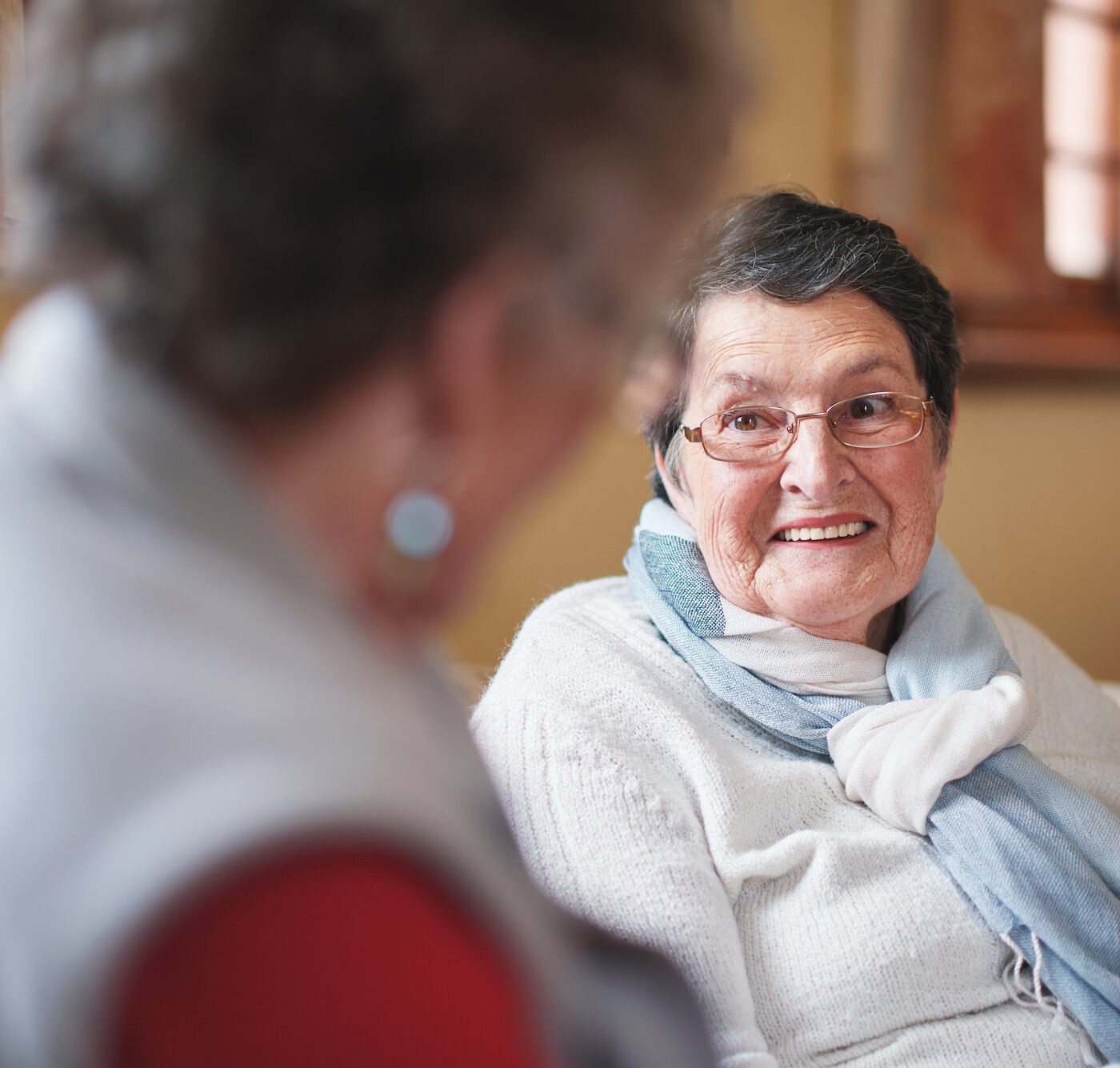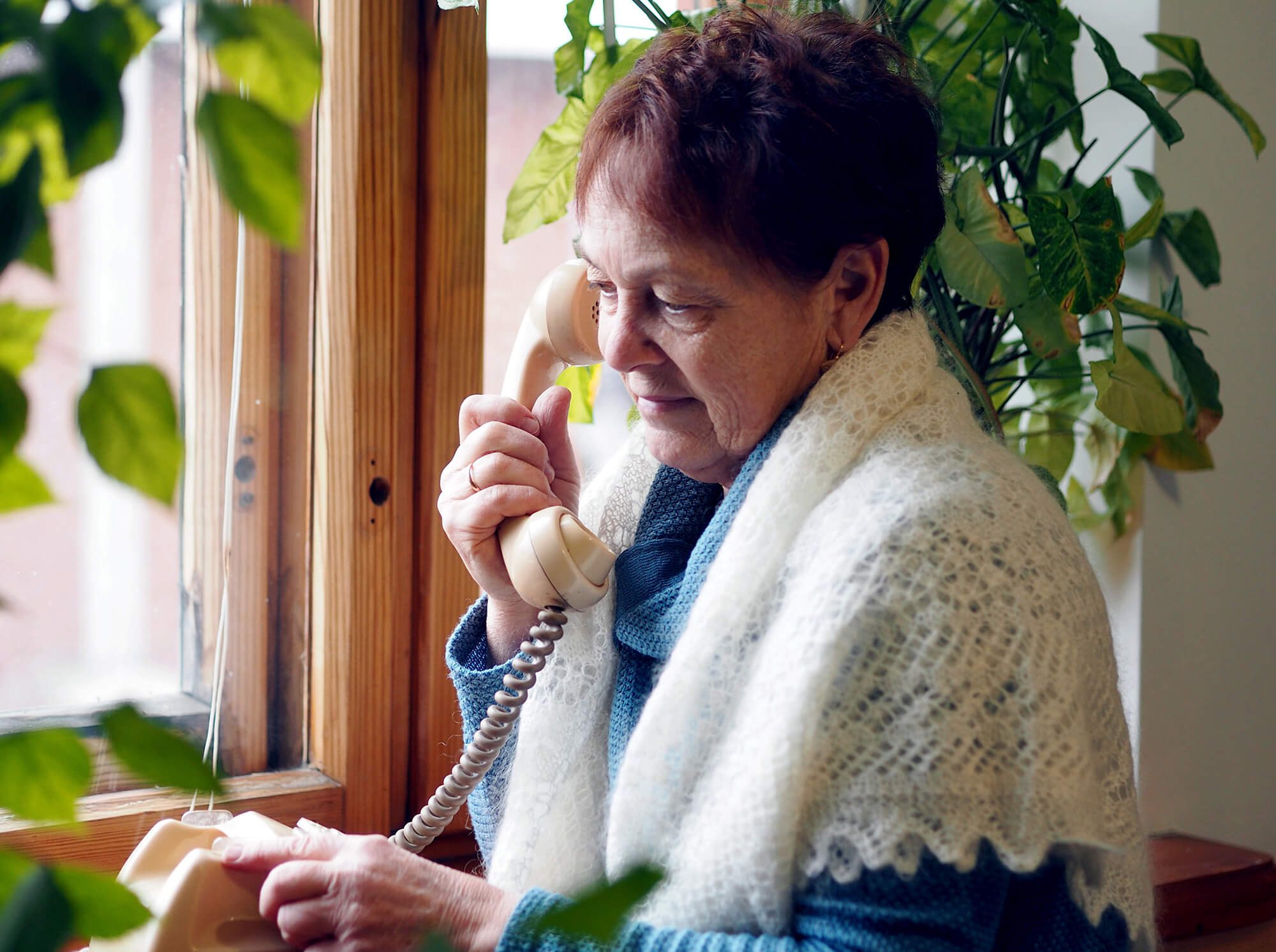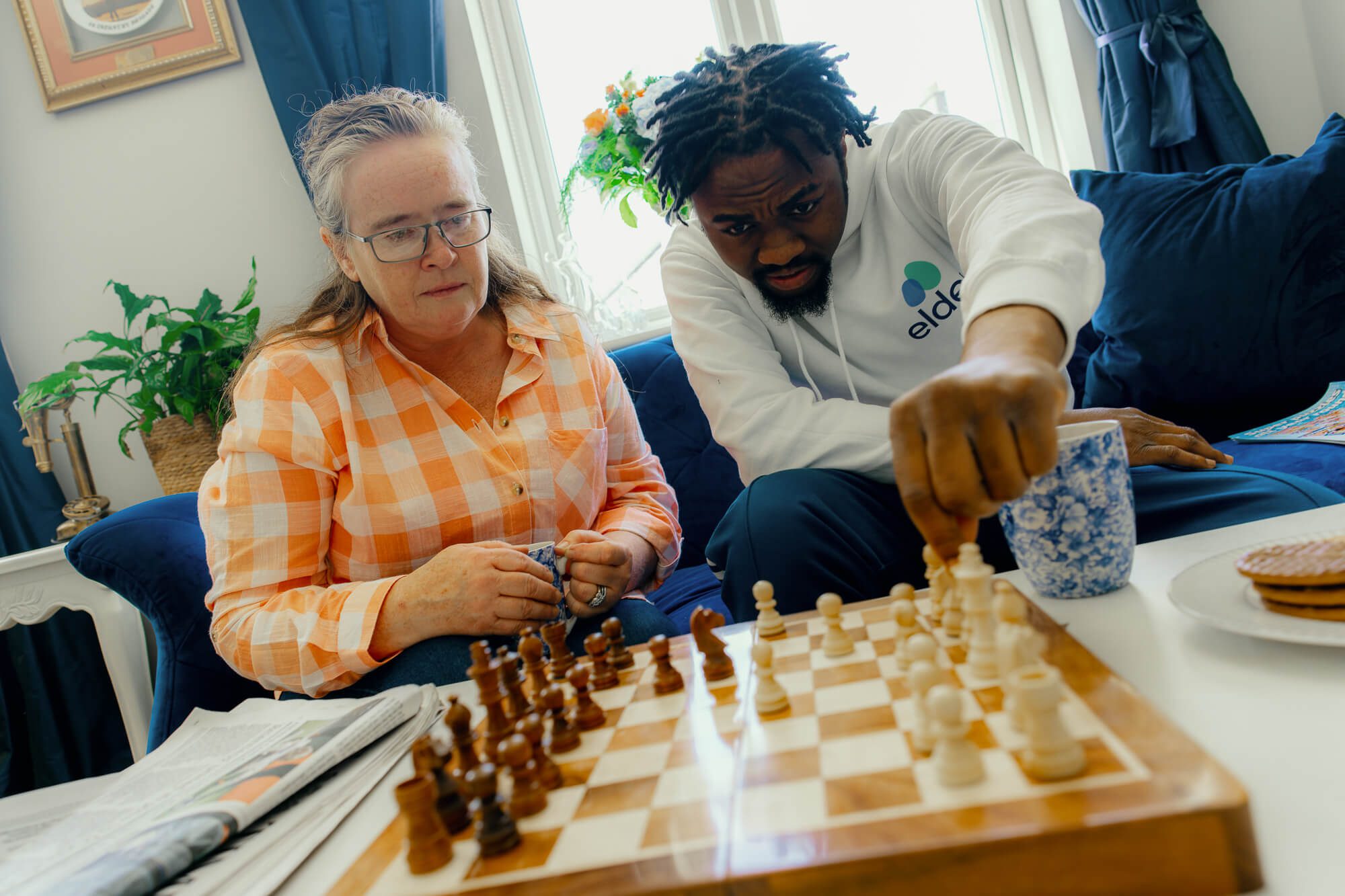Elderly mental health – what support is available?
Tags
Living Well
With people living longer today than in previous generations, it makes sense that mental health problems are becoming more common among older people. For example, Age UK found that 1 in 4 older people in England alone are living with a common mental health condition. Meanwhile, the Mental Health Foundation – the UK’s leading charity for mental health estimates around 22% of men and 28% of women aged 65 years and over are living with depression in the UK. Certain groups such as those in care homes, or caring for a spouse may be more at risk. Yet, it’s believed 85% of older people aren’t getting support from the NHS for their mental health.
Older people may feel it’s not something that should be discussed with others, they may see it as a stigma or a sign of weakness. They may even think of it as a normal part of getting older.
In this guide, we’ll look at some of the ways you can support an older loved one, as well as where to go for help and specialist resources.
Who’s most at risk of poor mental health in later life?
It’s important to understand that mental health difficulties can happen to anyone. However, certain situations or experiences may contribute too.
40% of older people living in care homes are experiencing late-life depression
Older people who have experienced bereavement are four times more likely to experience depression
More than 2 million people in England over the age of 75 live alone. This social isolation can increase the risk of developing a mental health problem
Mental health in older people
While poor mental health is common among older people only a small percentage seek treatment. This may be partly due to the stigma that they feel is associated with mental illness and the fact that many elderly people are reluctant to admit to depression or ask for help. In fact according to a 2022 study by Age UK people over the age of 65 made up just 5% of NHS referrals to talking therapies and mental health counselling.
In popular culture people with mental illnesses can be portrayed in a very negative light, and this may influence how older people view mental health problems. They may also believe that talking about mental health isn’t the ‘done thing’. Public conversation and initiatives around mental health have improved over the last few decades, but some older people may have been brought up to simply get on with things, rather than acknowledge how they’re feeling.
There may also be an element of ageism affecting the mental health services that are available for older people, with budgetary restraints meaning that they may be viewed as less able to benefit from the services than younger people.
Not only that, but dementia – a condition that at present affects over 55 million people worldwide – can have varying contributions to a range of mental health problems, including depression, OCD and schizophrenia.
Phobias can also limit what a person can do and in the worst cases can mean that an individual is unable to leave their home or have any normal kind of social life at all. Other mental health problems experienced by many people in the UK include schizophrenia, bipolar disorder, multiple personality disorder and post-traumatic stress disorder. If you’d like to learn more about specific conditions, the NHS has some informative guides on mental health issues here.
These illnesses can cause people to have real challenges and reduce their quality of life. Mental health problems can be experienced by anyone at any stage of life. They may withdraw from friends and family, lose interest in their favourite leisure activities, or become reclusive. Sometimes, they may neglect their personal hygiene and fail to care for their appearance.
Often as a result, their self-esteem can be impacted too, as can their ability to manage things like their medication or money.
Depression in old age
The Royal College of Psychiatrists estimate that 20% of older people suffer from senior depression.
The good news is, there is a 75% recovery rate if treated. However, older adults with depression are the least likely to see a GP, so this can be difficult – therefore it’s important others be aware of the signs.
Symptoms of depression can vary. You may notice that a loved one seems to have lost interest in their usual hobbies and pastimes. They may be becoming increasingly isolated and reluctant to meet up with friends and family. They may even neglect essential everyday activities such as personal hygiene, which could be a strong indicator that something isn’t right.
Bear in mind that the older generation doesn’t always feel comfortable discussing emotions and feelings, so exercise restraint and don’t force them to open up if they don’t want to. Instead, help them seek treatment from a professional. Age UK has a range of resources available to help you understand depression better.

The impact of loneliness
According to the Campaign to End Loneliness, social isolation is a rapidly increasing problem in the UK at present. The organisation reports that over half of people over the age of 75 live alone, with almost four million older people reporting that television is their main source of company. Around 11 per cent of elderly UK residents report that they have contact with other people, whether neighbours, friends or family, less than once a month.
Older people may have lost a spouse, and as their closest friends pass away or move to be nearer to their families, feelings of isolation and loneliness can quickly become part of their daily life, particularly if they have medical conditions that make it hard for them to get out and about. But even those in perfect health may find that loneliness has a profound impact on their day-to-day lives.
Financial problems may be a factor, as your loved one tries to save money by staying at home. They may not be able to drive or lack confidence on public transport which can play a big part in isolation too.
Research has proven that loneliness is detrimental to physical health, with one report estimating that the condition is as harmful as smoking fifteen cigarettes each day.
Mental health and care homes
A 2019 report by Age UK found that 40% of older people in care homes were experiencing depression.
Unfortunately, it’s not always easy to recognise if a person is experiencing mental distress in a care home environment. For example, moving into a care home is a significant life event that can take an emotional toll. If care staff are still getting to know a person they may not know which behaviours are part of adjusting to this change, and which may be more serious.
People with dementia commonly experience depression or anxiety – particularly those with vascular dementia. However, due to the neurological symptoms of the condition they may find it difficult to express their feelings to those around them. Sometimes a change in mood or behaviour may be put down to just being part of the condition, rather than being depressive symptoms.
The National Institute for Health and Care Excellence has looked at some of the other reasons why care home residents may face mental health challenges, and how managers can better promote positive mental well-being. –
- Personal identity – people need to feel like they’re being seen and treated as an individual with their own experiences and opinions, which means making time to find out what’s important to them. Giving choice over things like what they wear and where they sit when eating can be crucial.
- Meaningful activity – It’s not the quantity, but the quality of activities that are offered to residents that matter. Care staff need to ensure they’re motivating and stimulating, and that they offer opportunities to learn something new, not simply aimed at keeping older people busy.
- Health and well-being – Care staff should be aware of each resident’s physical health conditions and mental state, actively look for any changes in their behaviour and ensure everything is recorded in residents’ care plans.
How do you talk to an elderly person about mental health?
As we’ve covered – speaking about a mental health concern isn’t always easy for older people, and even if you bring up the subject first, they may not be responsive to it.
Age UK has some helpful tips for how to talk to someone if you’re worried about how they’re feeling or coping –
- Take a step back and look at the situation objectively
- Ask open questions. Don’t try to ‘fix’ their problem or impose your own opinions
- Be prepared to have more than one conversation, and that steps forward may be small
- Put yourself in their shoes – do you understand their feelings and their situation?
- Are you the best person to help? If you’re not that’s okay, you can still support them by helping them to find someone neutral or a relevant professional to speak to
How can you support an older person with their mental health?
The following may help promote positive mental health in later life –
Let them know it’s okay to talk about how they’re feelings – If you notice a change in their mood or behaviour that lasts longer than two weeks or keeps returning, it may be time to gently ask how they’re doing, and let them know that you’re there if they need anything – even if it’s just weekly cup of tea and a chat. If they don’t feel comfortable talking to you or another loved one, let them know that their GP isn’t only available for physical health concerns, but can listen and signpost them to things that may help.
Help them to make new social connections – If someone is feeling cut off from the outside world there are many ways they can connect with and build friendships with others:
- A telephone befriending service like the SilverLine or Rengage can match up your loved one with a new companion who will give them a call a few times a month for a chat – kind of like a telephone pen pal.
- You can help them find their local Age UK friendship centre. They can be a great way for your loved one to meet people who they can try new experiences or enjoy days out with. Age UK also offers a wide range of social groups throughout the country for people with a wide range of hobbies and interests – from Men in Sheds, to photography. You can find out more here.
Practice self-care – If you’re looking after an older loved one, help them make time for the things that bring them joy. This may mean getting outside into nature, watching a favourite film, or sitting by themselves for a bit to read.
Help them build a healthy sleep routine – If they’re having difficulty sleeping, ask them if there’s anything they’d like to try to help them relax and unwind at the end of the day – such as a long bath or a hot drink.
Getting plenty of light exposure during the day can help people to feel more sleepy at night too, plus, being outside can help limit the temptation of a daytime nap. They may also find it helpful to get ready for bed early, and do everything they need to do so there’s nothing to distract them from sleep later on.
For more tips on getting quality sleep, take a look at this advice from Channel 4 sleep expert Stephanie Romiszewski.
Create a structure for each day – Structure helps provide a sense of purpose – without it the days can begin to blur into one, and it can be difficult to find the momentum to do things. Try sitting down with them and planning out goals and tasks in a calendar. Even something as simple as a 10-minute walk every lunchtime can begin to add some positive structure.

What services are there for older adults with mental health issues?
The first step in getting help with mental health, as with any health worry is to seek guidance from your GP. They may refer you for a mental health assessment to understand which type of NHS mental health care will be best for you.
The NHS offers a range of mental health support services across the UK – including group CBT and individual counselling or talking therapy. Some local social services offer mental health support too. However, waiting times can be long and may depend on how in-demand services are in your area.
If you don’t want to wait, you may wish to seek out a private local therapist. A useful place to start is the British Association of Counselling and Psychotherapy’s directory. Here you can search for a therapist by their location, specialism, or the problem you’d like help with. Bear in mind that the cost of private therapy can differ according to where you live, but may range between £40-£100 a session. Some therapists do offer concessionary rates.
It’s not just health care professionals that can offer support – a number of charities offer free mental health advice and information. A few examples include –
- Age UK – The UK’s biggest organisation dedicated to improving the lives of people in later life. They offer a huge bank of free resources, conduct insightful studies and signpost to relevant support services
- Mind – The UK’s leading mental health charity offering free guides and information from health care professionals, local community mental health services, and online peer-to-peer support groups
- MindEd – a free online resource centre for older people and their families offering clear information and actionable steps
- Campaign to End Loneliness – videos, guides and useful links to help people experiencing loneliness
If your loved one is happy to use technology they may find certain mindfulness phone or tablet apps useful. If they live with a partner or family member, or our receiving long-term care – someone else may be able to guide them through the tasks and handle the technology side of things if they’re not confident doing this themselves. Popular apps are –
Calm – the UK’s number 1 app for meditation and sleep. Users can set goals and complete activities designed to help them get more hours of sleep, reduce feelings of anxiety, or improve daily focus.
Headspace – offers mindfulness tools to help with everyday life. Users can access a huge library of meditations, sleep sounds, yoga activities, and focus music.
How live-in care can help
Daily life can feel difficult sometimes – especially if you live alone, have few friends, or feel your health limits what you can do.
An experienced live-in carer can step in and support both practically, and emotionally to help an older person feel more like themselves again. They’ll help out with any tasks that may have become too much, encourage them to get out and about in the community safely, and be there to talk to.
A live-in carer may be able to help an older person with –
- keeping the home clean and tidy
- meal planning and preparation, promoting a healthy diet
- ensuring someone’s there to talk to
- emotional encouragement and companionship
- Carrying on with daily activities, hobbies, and interests
- personal care support
- looking their best
- managing and attending social activities
- medication reminders
- keeping on top of appointments, post, and phone calls
Read more later life articles

12 summer safety tips for the elderly
It’s important for everyone to take care in hot weather – anyone can become unwell if they’re exposed to soaring temperatures. However, for older people

Live-in care vs other types of care
Live-in care vs other types of care Navigating elderly care options for a loved one is a significant decision. While care homes are a common

Defining Dignity in Later Life – Interview with Liz Lloyd
We talked to Liz Lloyd about personal and social perceptions of age, the challenges of identity, empowerment and choice.

The Challenges of Vegetarians and Vegans Living with Dementia
We talk to Amanda Woodvine about the challenges faced by older vegetarians and vegans receiving care. Read more here.

How much does live-in care cost?
How much does live-in care cost? Live-in care provides one-to-one support in the comfort of your loved one’s home, but how much does it cost?

How much does respite care cost?
Respite care offers short-term relief for primary carers, and the cost can vary widely depending on the type of care, location, and level of support